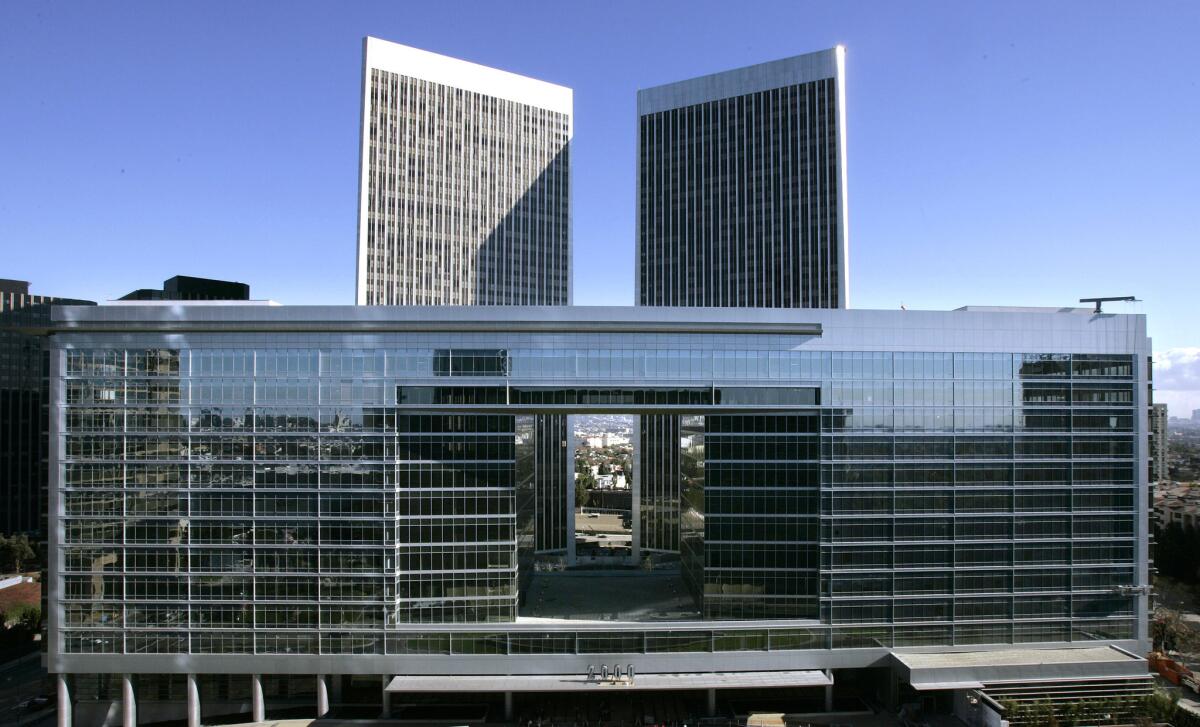Five takeaways from CAA’s lawsuit against rival UTA

Exteriors of the new building at 2000 Avenue of the Stars that houses several offices including the Hollywood agency CAA.
- Share via
In what was an expected next move in the battle royal that hit the agency business world, Creative Artists Agency filed a lawsuit against rival firm United Talent Agency in the aftermath of the mass exodus that transpired earlier in the week.
Or as CAA refers to it in its lawsuit: the “lawless, midnight raid.”
In one of the biggest shakeups to the agency business in decades, CAA suffered a major blow this week with the defection of at least 10 agents representing stars including Chris Pratt, Ed Helms and Will Ferrell to rival United Talent Agency over the course of 24 tumultuous hours.
In the lawsuit filed late Thursday in Los Angeles County Superior Court, Century City-based CAA called the flight of 10 agents (so far) to UTA a “desperate attempt to steal clients and employees,” according to a copy obtained by The Times.
Here’s what we gleaned from reading CAA’s claims within the 18-page lawsuit:
1) The suit alleges that Gregory Cavic and Gregory McKnight, two longtime CAA agents, were the organizers of the withdrawal. McKnight and Cavic — who have worked at CAA since 2004 and 2005, respectively — were not under contract to CAA, but the suit states that “while still on CAA’s payroll and while still accepting generous compensation and benefits from CAA, worked clandestinely with each other and UTA to induce a number of CAA employees to abruptly terminate their employment with CAA to join UTA.”
2) It claims “improper recruitment” of at least three CAA agents still under contract: Dominic Nuciforo, Michael Lesak and Jason Heyman. Nuciforo had seven months left to fulfill, with his contract set to expire on Oct. 17. Lesak’s contract was set to expire on June 23, 2016. Heyman’s contract was slated to end June 23, 2016.
3) The suit claims the plan to jump ship began no later, “or possibly even before,” January of this year “with the deliberate intent to divert CAA’s employees and to disrupt CAA’s exisiting and propective client relationships and business opportunities.”
4) The agency is seeking damages, including punitive damages, which allow a plaintiff who prevails in court to collect more money from the defendants. CAA has asked for a jury trial.
5) Damages are not specified, but they could reach into the tens of millions of dollars once the dust settles and it becomes clear just how many up-for-grabs CAA clients decide to make the move to UTA with their agents. Punitive damages and legal fees also are requested.
I tweet about TV (and other things) here: @villarrealy
More to Read
Sign up for The Envelope
Get exclusive awards season news, in-depth interviews and columnist Glenn Whipp’s must-read analysis straight to your inbox.
You may occasionally receive promotional content from the Los Angeles Times.










